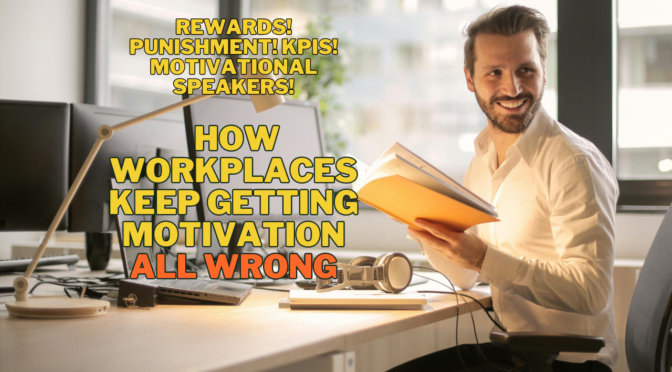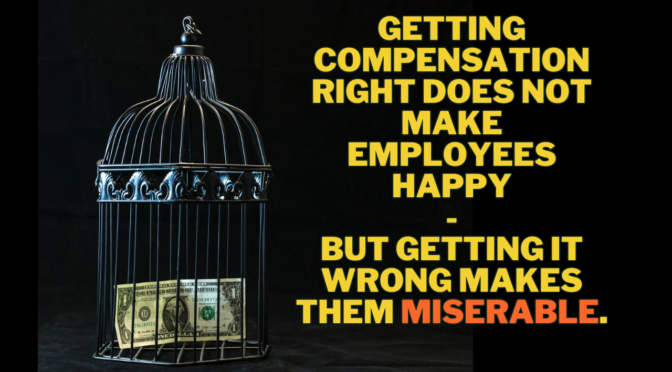Two Danish bosses decided to greet their employees in a special way one Monday morning. Each employee got an energetic, friendly (and loud) greeting and a breakfast plate to take to their desk.
My first “real” job was for a large and very famous Danish company who’d hired me fresh out of university to work on one of their big new products. One day, about a month into my employment there, I was sitting at my desk thinking big thoughts.
To other people it might have looked like I was slacking – I’d put my feet up on the desk and was staring into the air – but in reality I was considering if the approach I’d chosen to solving a particular task was the right one or of there was a smarter, faster way.
And for that I was reprimanded. When my manager walked by and saw me sitting there, he criticized me for goofing off. As long as he could see me pecking away at my keyboard, he felt confident that I was productive. Seeing me with my feet up automatically made him assume that I was wasting time.
Companies everywhere are looking to increase productivity. Employees are asked to work more efficiently and get more done faster. But it seems to me that the constant focus on short-term productivity gains is hurting long-term results because employees’ work days are filled to capacity (and over) with tasks, meetings, deadlines, projects, etc.
What’s missing from that picture? Free time. Or as some call it: Slack.
In the excellent article ”In Praise of Slack: Time Is of the Essence” from The Academy of Management Executives M. B. Lawson writes about the importance of having time during your work day that is not already taken up with tasks. From the article:
Slack is important for organizational adaptation and innovation.
Increasingly complex systems and technologies require more, not less, time for monitoring and processing information. Future demands for strategic flexibility and for integrating learning and knowledge throughout organizations highlight the need to reexamine the importance of time in organizational work – and to recognize that all organizational resources cannot be committed to immediate output efforts if we are to have time to pay attention, think and benefit from the knowledge gained.
Some managers (among them my first team leader) see all free time as wasted time, but they’re completely wrong. When every moment of the work day is taken up with tasks and work, it damages the organization in many ways. Here are some we’ve seen among our clients:
- Creativity is lost because there is no time to come up with and act on new ideas.
- No one helps anyone else, because people are booked 100% (or more) on their own tasks
- There’s no time to learn new skills
- We end up always doing things the same way because there’s no time to optimize processes
- Customers become less happy because there is no time to go the extra mile and deliver great customer service.
- Everything becomes a chaotic mess because there is no time to organize and structure things
- Flexibility is lost because everyone is too busy to deal with changing circumstances
- Employees become less happy and more stressed because there is no time to deepen your skills
In short, organizations without slack become stiff and brittle and lose the ability to lift themselves out of their current problems and create ongoing improvements. These organizations become extremely fragile in the face of any unforeseen changes.
So slack is great for employees and for the workplace. But it must be created consciously. Workplaces must make a concerted effort to show employees
How do you do that in practice? Here are 5 ways we have seen work well in practice.
- Hackathons are well-known in software companies. Employees are given time (frome 1 day to several days) to work in groups on any project of their own choosing. At the end, teams present their results.
- 20%-time (popularized by companies like 3M and Google) means that employees can devote up to 20% of their work week to projects they come up with themselves.
- Training and development is crucial. In the company I co-founded, every employee had an annual training budget of 2 weeks and 8,000 USD, which they were required to use.
- Minimize time spent on useless meetings, status reports and similar.
- Plan for slack so that employees’ work week can not be booked 100%. Software company Menlo Innovations in the US, only let their people budget for 32 hours a week – they know that the rest is spent on planning, training, coordinating, etc.
Of course workplaces need to become more competitive and productive. Of course we must constantly try to do more with the resources we have. But we can’t expect people to become more effective, if they never have time to reflect, plan, learn or try out new ideas. That takes slack.
Your take
Do you have free time at work? Or is every minute filled already? Are people in your workplace rewarded or punished for stopping what they’re doing, so they can figure out a better way to do it?
Write a comment, I’d love to hear your take.











